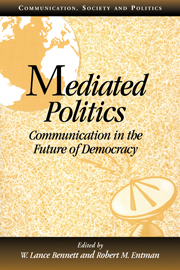Book contents
- Frontmatter
- Contents
- List of Figures
- List of Tables
- Contributors
- Preface
- Acknowledgments
- 1 Mediated Politics: An Introduction
- Part 1 Democracy and the Public Sphere
- 2 The Public Sphere and the Net: Structure, Space, and Communication
- 3 Promoting Political Engagement
- 4 The Internet and the Global Public Sphere
- Part 2 Citizens, Consumers, and Media in Transition
- Part 3 Mediated Political Information and Public Opinion
- Part 4 Mediated Campaigns
- Part 5 Citizens: Present and Future
- Index
3 - Promoting Political Engagement
Published online by Cambridge University Press: 05 June 2012
- Frontmatter
- Contents
- List of Figures
- List of Tables
- Contributors
- Preface
- Acknowledgments
- 1 Mediated Politics: An Introduction
- Part 1 Democracy and the Public Sphere
- 2 The Public Sphere and the Net: Structure, Space, and Communication
- 3 Promoting Political Engagement
- 4 The Internet and the Global Public Sphere
- Part 2 Citizens, Consumers, and Media in Transition
- Part 3 Mediated Political Information and Public Opinion
- Part 4 Mediated Campaigns
- Part 5 Citizens: Present and Future
- Index
Summary
In the voluminous literature on the quality of public discourse, there is a recurrent theme that, in a democracy, public discourse can and should empower citizens, give them voice and agency, build community, and help citizens to act on behalf of their interests and values. The normative standard here is one of engaging citizens in the democratic process through their active participation in the public sphere.
One important strand of democratic theory rejects this normative standard. Its proponents argue that it is natural and even desirable for citizens to be passive, quiescent, and limited in their political participation in a well-functioning, party-led, representative democracy. In such a limited citizenship model, the citizen's role is to choose periodically who among competing teams of would-be office holders will exercise public authority. Open competition for citizen votes ensures responsiveness and accountability. If people don't like what they are getting, they can vote the rascals out. In the interim between elections, officials need to respond to problems that are technically complex, and most people have neither the inclination nor the ability to master the issues involved.
To expect citizens to be actively engaged in public life is seen by advocates of this view as at best wishful thinking, what Baker (1998) in summarizing this theory characterizes as a “romantic but idle fantasy.” At worst, encouraging such engagement obstructs and complicates the problems of democratic governance by politicizing and oversimplifying complex problems that require skilled leadership and technical expertise.
- Type
- Chapter
- Information
- Mediated PoliticsCommunication in the Future of Democracy, pp. 56 - 74Publisher: Cambridge University PressPrint publication year: 2000
- 8
- Cited by



